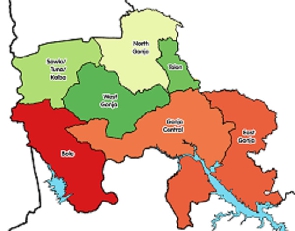Opinions of Tuesday, 2 May 2023
Columnist: Abdul Rasheed Gariba Iss-Hak
Imamship in Gonjaland: Historical antecedents
Introduction
Religious cultural practices reflect values, norms, and beliefs held by members of a community spanning over generations. All social groups in every part of the world have specific leadership practices and systems of beliefs which often have strong religious and cultural underpinnings.
The Gonja state has been largely influenced by Islamic traditions. Subsequently, it developed into a unique culture which can be differentiated from other traditional societies in northern Ghana. The symbiotic relationship between the Gonja state and Islam is what blend to define the Gonja tradition. Since then, all Gonja customs and traditions have become underpinned by Islamic tradition, including the negotiation of imamship and religious authority.
The Sakpare imamate of the Gonja state
Islam has been articulated into the Gonja societies and was made a state religion through the creation of the Sakpare Imamate. The imamate was founded by Isma’il Kamagtey a renowned Faqih (an Islamic Jurist) and his son Muhammad Al-Abyad otherwise known as Fatigi Morukpe as the first Imam of Gonjaland. This imamship is one of the most prominent and respected Islamic institutions in Gonja state. Divisional imams are chosen from among the lineage of the founder with the approval of the Gonja chief. The imams play a very significant role in the religious affairs of the Gonja state.
They are entrusted with the task of offering supplications during festivals and other ceremonial occasions of the state, naming ceremonies and praying for the chief’s victory during wars of conquests and performing other functions in
furtherance of the Islamic aspirations of the Gonja state.
These imams are assigned to each divisional chief of the Gonja state for the smooth running of the state, and by virtue of their important roles in governance have attracted considerable influence over the socio religious life of the Gonja people.
According to the Gonja chronicle a meeting took place between Sumaila Ndewura Jakpa and Fatigi Morupke when the former set out with his army from the Mande territory on a mission of a conquest. As Nehemiah (1968) put it “If you want to wage war and you don’t find a Mallam, it is impossible for you to do so”. Jakpa then asked Fatigi Morukpe to join him in his campaign with his spiritual powers and prayers. It was agreed that in every town they would conquer, Ndewura Jakpa will appoint from his lineage a chief and Fatigi Morukpe’s decedent, the Imam.
Having agreed to accompany Ndewura Jakpa, Fatigi Morukpe’s presence introduced some distinct Islamic cultural values to the people of Gonja, which I described the Gonja Islamic tradition. Subsequently Islamic influence took shape in the Gonja royal palace and became a state religion. This Sakpare clan of Gonja is the guardian of Islamic lore in the Gonja state that derives its vitality and authority from the Gonja tradition. Thus, the traditional arrangement of
the Gonja state credits only the Sakpare clan with the religious authority to produce Imams for the Gonja state in all the five divisions of the Gonja state.
So, the requirement by candidates to traced their lineage to Fatigi Morepke of the Sakpare (Kamagtey) ward of Gonja is in line with the Gonja Islamic principle on which the Gonja state was establish.
The Yagbon Imam as the supreme Chief Imam of Gonjaland (Savannah Region)
West African Muslims adheres most exclusively to the Maaliki school of law. The founders of the Gonja state were Malikis who subscribed to the Malik’s school of law. And so, the position concerning the appointment of the imam in the Maliki school of law regard the appointment of the Imam as the prerogative of the ruler in the first instance. In the case under consideration, nominees to the Yagbon imamate are chosen from among the descendants of Fatigi Morupke and, in theory at least, have to be approved by the overlord of the Gonja state. The Yagbon
Imam is the custodian of the Gonja Islamic spirituality. He is attached to the Jakpa palace as the grand mufti and the supreme Chief Imam of the Gonja state.
This Gonja Islamic tradition defines the collective spiritual aspirations of the Gonja people and all Gonjas are require by tradition to protect it.
This Sakpare imamate of which the Yagbon imam is the supreme Chief Imam, has been well established in the Gonja traditional arrangement over centuries. The imamate derives its vitality from the Gonja tradition and the diverse social classes in Gonjaland. Candidate for the Yagbon imamship are carefully nominated in accordance with the Islamic principle and its fundamental doctrines.
Therefore, any trajectory of questioning the Yagbon imam’s position as the supreme Chief Imam of Gonjaland (Savannah Regional) must be seen as undermining the principles on which the Gonja state was established.
It is instructive to state that Gonjaland is not different from Savannah region and political demarcation cannot affect the existing Islamic tradition in Gonjaland which clearly established the legitimacy of the Sakpare imamate with the Yagbon Imam as the Supreme Chief Imam of the Gonja state. Suffice it to state that, so long as Gonjaland remains Savannah region, every Yagbon Imam is the automatic Imam of the region just as every Yagbonwura is the automatic
President of the Savannah regional house of Chiefs.
Also, the assertion that “The regional imamship is a scholarly appointment while the Yagbon imamship is a traditional appointment” is unknown statement to the history of imamship even in modern Ghana.
This is because historically, the appointment of Imams in modern Ghana was the prerogative of the Muslim chiefs. (Sarkin Zango) So, the Zongo chief appoints the community Imam in consultation with the sub- chiefs. This process of choosing ethnic and community Imams was therefore extended by the chiefs to the appointment of district and regional Imams, and finally to the National Chief Imam respectively. (Kassim Ameen, 2022)
My position was reinforced by the fact that the appointment of the National Chief Imam of Ghana was not conceived by any community of scholars but rather the Muslim chiefs with the support of some Muslim clerics as it is in the case of Gonja which predates modern Ghana.
Sulemana recounts as cited in Kassim Ameen 2022, that the appointment of the National Chief Imam of Ghana was conceived by Muslim chiefs in Accra in 1982. He argued further that when Imam Mukhtar Abbas, who was the Imam of Accra at the time, became incapacitated the chiefs appointed Sheikh Osman Nuhu Sharubutu as the acting Imam of Accra who later became the national Chief Imam of Ghana. It is therefore out of place to question the legitimacy of the Yagbon Imam who’s imamship is authenticated by the chiefs and overlord of the Gonja state.
In conclusion, Gonjas are Muslims who accommodate those of the wider society while at the same time maintaining some unique Islamic identity. I pursue the line of argument that Gonja traditional imamship derives its foundation from Islam. However, people are entitled to critique any of its aspect without necessarily questioning its legitimacy. The progress of a Gonja Islamic identity which is concerned about Gonja collective Islamic culture must continue to be
protected not only by Gonjas but all Ghanaians.
It would be necessary at this point to draw the attention of the royal estate of the Gonja state, that any act of undermining the legitimacy of the Yagbon imam and taking the Yagbon imamship out from the Sakpare clan of Gonja will mean a fragmented Gonja tradition, a tradition which will not be complete without the Sakpare imamate. This is because the founders of the Gonja state demonstrated their desire for Islam that was not just moderate and meaningful to their spiritual aspirations, but also one that is practical and relevant to their world view and culture, hence the Sakpare imamate of the Gonja state.













